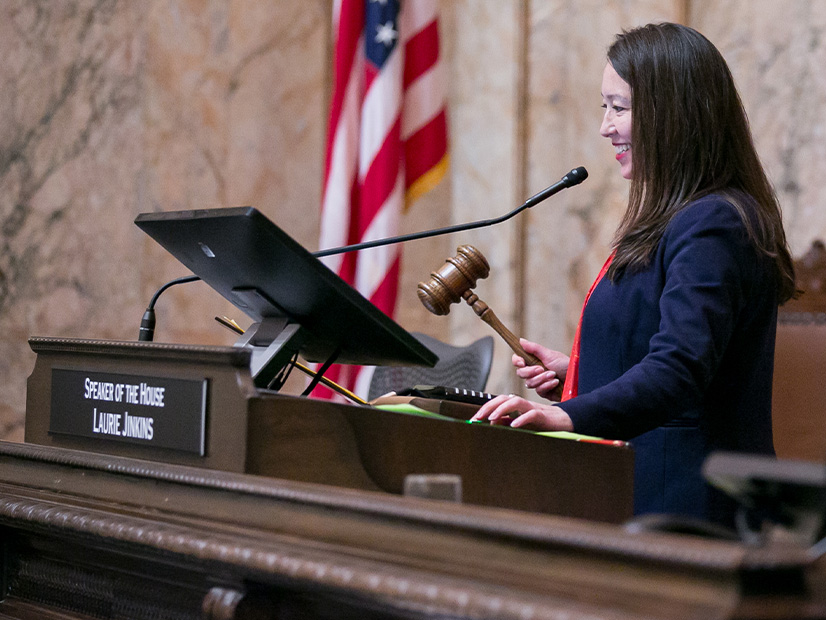Parliamentary delay tactics by legislative Republicans last week killed a Washington bill to add climate change considerations to city and county land use planning.
House Bill 1099, sponsored by Rep. Davina Duerr (D), would have made the change by revising Washington’s Growth Management Act (GMA), which regulates long-range land use planning for Washington’s city and county governments. It requires counties and cities to review and, if needed, revise their comprehensive plans and development regulations every eight years.
GOP tactics in the Washington Senate and House led to the bill’s death in the last evening of the legislature’s 2022 short session, which could not go beyond midnight Thursday. The session ended at about 11:30 p.m.
Duerr’s bill would have added “environmental resiliency” as a goal of the GMA and required the concept to be considered in land use and shoreline planning for the 10 largest of Washington’s 39 counties and in cities of 6,000 people or larger. The 10 largest counties cover Puget Sound, Spokane, the Yakima River Valley and the Washington-side suburbs of Portland, Ore. A 2021 legislative memo said 246 county and city governments would be affected, including 110 jurisdictions outside the 10 most populous counties.
The bill called for city and county comprehensive plans, development regulations and regional plans to “address jurisdictional needs for resilience to changing conditions and protect and enhance environmental, economic, and human health and safety,” according to the bill’s report.
It would have also required the state Department of Commerce to set guidelines by 2025 on how covered areas can reduce greenhouse gas emissions and vehicle miles traveled. Because 45% of Washington’s greenhouse gas emissions come from motor vehicles, traffic issues would become a priority in those guidelines.
Going into Wednesday, the House and Senate held different versions of the bill and had to go into compromise talks. While the differences were quickly hammered out, the majority Democrats in both chambers added language to allow cities to add real estate tax breaks based on being within a quarter mile of a transit station. The idea is to encourage higher housing density around transit stations to cut down on car traffic.
The real estate tax breaks were not in either version of HB 1099 prior to Wednesday.
At Thursday’s floor vote, Senate Republicans challenged the extra language as being illegally beyond the scope of the bill. Lt. Gov. Denny Heck’s staff researched the challenge for hours before Heck decided the addition was technically legal. As the Senate’s presiding officer, Heck’s duties include ruling on such matters.
“I don’t feel good about this one. This was a very, very difficult issue … This was not a clear case,” Heck said.
The Senate then passed the bill 28-21 along party lines.
Talking the Bill to Death
As Thursday evening unfolded, House Democrats faced a big debate on large operations and transportation budget packages. House Republicans told House Speaker Laurie Jinkins (D) that all 41 GOP members planned to speak in the debate on House Bill 1099. Jinkins said that that would stretch the floor debate, preventing one of two budget packages — both opposed by the Republicans — from passing before the midnight deadline.
“It was possible for the Republicans to kill the bill just by talking. … We got a clear message that it would be talked to death,” Jinkins said.
At Wednesday’s conference committee meeting, Rep. Mary Dye (R) argued the bill in its present form could have unintended consequences, but she did not elaborate further on what they could be. “We don’t have answers to the impacts of this sweeping policy. … I think it is premature to make a policy of this scope,” Dye said.
Duerr countered Wednesday, saying the issue “needs a sweeping solution.”
On Thursday, Republicans argued that adding climate change to the Growth Management Act will increase housing costs at a time when Washington is facing a housing shortage
Senate Minority Leader John Braun (R) said Democrats “decided climate change is the most important thing. … But the citizens of Washington are in the middle of a housing crisis. … This does harm to the people of Washington by driving up the costs of regulation.”
Democrats painted housing and climate change as parallel problems, not as an “either-or” situation.
“It’s important that we act now on climate change. It’s important that we act now on housing,” said Sen. Liz Lovelett (D). The legislature has passed several housing-related bills this session.
This was the second failed legislative session for Duerr’s bill. (See Land Use Climate Bill Gets Second Life in Wash. Legislature.)
In 2021, the House passed the bill and the Senate Ways and Means Committee recommended approval, but it stalled in the Senate’s Transportation Committee. The proposal would require comprehensive plans, development regulations and regional plans to support state greenhouse gas emissions targets and improve resilience against climate impacts and natural hazards.
In 2021, the Senate Transportation Committee was chaired by then-Sen. Steve Hobbs (D), a moderate who sometimes crossed party lines. Gov Jay Inslee later appointed Hobbs as secretary of state to replace Kim Wyman, who joined the Biden administration as an election security expert. Liberal Sen. Mark Liias (D) replaced Hobbs as transportation committee chairman, and the bill sailed through that committee this year.



